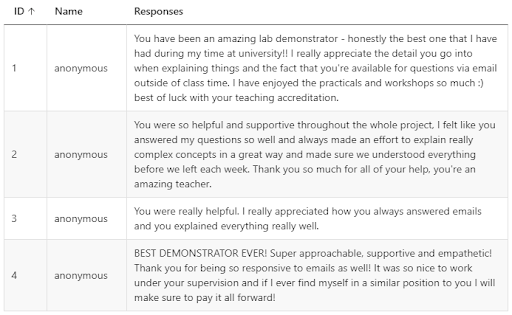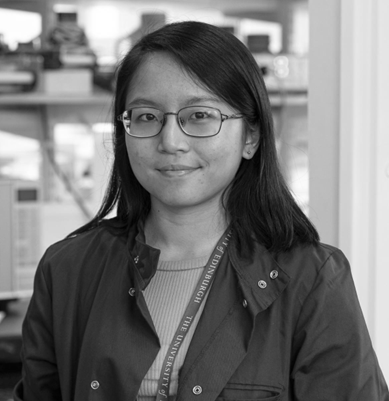
In this extra post, Molecular Plant Science PhD student Apple Chew reflects on her journey towards the successful award of the Associate Fellowship of the Higher Education Academy, gained through The University of Edinburgh’s Introduction to Academic Practice course.
I learnt about the Introduction to Academic Practice (IntroAP) course by accident during Covid-19 lockdown. It is one of the few ways to get the Associate Fellowship from Higher Education Academy (AFHEA) teaching accreditation for both staff and student tutors and demonstrators. The course group size ranged from 30 to 46 participants in the past 3 years from different Schools around the university (Table 1).
| Start Date | Enrolled | Completed | Did not initially pass or dropped out | Completion rate |
| Semester 1 19/20 | 46 | 38 | 8 | 82.6% |
| Semester 2 19/20 | 30 | 25 | 5 | 83.3% |
| Semester 1 20/21 | 38 | 33 | 5 | 86.8% |
| Semester 2 20/21 | 46 | 35 | 9 | 76% |
| Semester 1 21/22 | 40 | 37 | 3 | 92.5% |
| Semester 2 21/22 | 40 | 34 | 6 | 85% |
Table 1. Number of participants enrolled and the completion rate in IntroAP from various recent academic semesters. Data was provided by Fiona Quinlann-Pluck from IAD.
I will not delve into the specifics of the IntroAP course as you can find all the information on the Institute of Academic Development (IAD) website and a blog about IntroAP.
Having gone through the course and obtaining my AFHEA, here are a few things that I would like to share with you if you’re considering to apply for IntroAP:
- It is not as easy as you think. As a biologist, having no social science background, reading pedagogical literature was very odd to me. Sometimes, it could take a longer time to critically read or comprehend the literature so do allocate extra time for this.
- The IntroAP course is not a box-ticking exercise or something to ‘boost your CV’. It is for tutors and demonstrators who really want to improve their teaching and delve into pedagogical discussions.
- Time commitment and management is crucial. Apart from the three workshops that you have to attend, there are asynchronous pre- and post- online tasks that you would have to complete as well. These do take up time if you have a full-time PhD or job alongside the course.
- The completion rate is not reflective of the quality of the course or instructors. It is dependent on the participants’ commitment, hard work, and determination (Table 1).
- If you want a strong application to get into the course, you should give your references reasons to support your application. Instead of sitting at the back seat and passively delivering materials developed by course organisers, you could actively contribute to discussions, suggest improvements and give feedback in briefings.
- There is a mandatory peer teaching observation in the course. You should be prepared and be open-minded to receiving critical feedback about your teaching. I really enjoyed the new experience and learnt a lot from observing my peer’s teaching from a student’s perspective.
My IntroAP experience has been very valuable. We were required to reflect regularly on our teaching; share our teaching experiences; contribute critically to discussions and literature; and write up a final reflective assignment. I was not taught how to reflect in school and university, and I found that it was quite a difficult skill to master. Nevertheless, IntroAP provided plenty of tools and resources on how to write reflectively. Additionally, IntroAP instructors Emily Woollen and Fiona Quinlann-Pluck are absolute gems who are approachable and available to answer any questions or concerns at any time during the course. The two most useful takeaways from the course were the diverse pedagogical perspectives from other participants and the pedagogical network that I’ve built.

In a biology module, my students definitely benefited from my participation in IntroAP as I put theory into practice in my teaching. A small improvement that I’ve made was learning my students’ names, where they’re from, and referring to them with their names (Figure 1). It was great to see so much cultural diversity in my group. My students appreciated that I was trying, even though I’m not the best at remembering names. One of the few unexpected outcomes was that students started reaching out by email for career and internship advice. The conversations with a few students slowly started to veer into a mentor-mentee relationship. I collected feedback from my students after our last tutorial and it was positive and heartwarming (Figure 2).

I would highly recommend taking IntroAP if you’re interested in a teaching career in higher education or simply want to improve your students’ learning experience. I am happy to be contacted on LinkedIn or Twitter if you would like to know more about my IntroAP experience.
Yen Peng (Apple) Chew
Apple Chew is a PhD student in the Institute of Molecular Plant Sciences at The University of Edinburgh. She has an Associate Fellow of the Higher Education Academy. Her research focuses on developing and improving gene editing tools for green microalgae Chlamydomonas reinhardtii.


